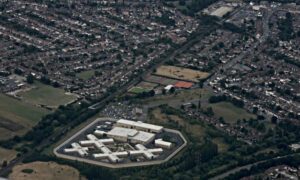UK Government Implements No-Fly Zones Around Prisons to Combat Contraband Smuggling via Drones

H.M. Prison Bronzefield from the air by Thomas Nugent, CC BY-SA 2.0
UK Implements No-Fly Zones Around Prisons to Combat Smuggling via Drones
In a significant move to counter the rising threat of contraband smuggling into prisons, the UK government has introduced new regulations establishing 400-meter drone ‘no-fly zones’ around prison facilities. The announcement, detailed in a UK government press release dated January 25, 2024, aims to address the escalating use of drones by criminal gangs attempting to transport illicit items, including phones, drugs, and weapons, into prisons.
Under the new legislation, it is now considered an automatic offense to fly drones within 400 meters of prisons and young offender institutions. The previous requirement for police intervention was contingent on evidence of contraband smuggling. Drone operators violating these restrictions could face fines of up to £2,500, while those involved in smuggling illegal items that contribute to violence and criminality within prisons may face a maximum prison sentence of ten years.
The initiative is a response to the alarming increase in the number of drones detected or sighted within prison grounds, which more than doubled between 2019 and 2021, according to revealed figures. The introduction of virtual ‘no-fly zones’ is expected to enhance law enforcement’s ability to catch organized criminals in the act, facilitating more effective prosecutions, convictions, and the imposition of lengthy jail terms. Additionally, these anti-drone measures are designed to prevent illegal aerial filming of prisons, further bolstering security.
Prisons and Probation Minister Edward Argar emphasized the government’s commitment to staying ahead of the tactics employed by organized criminals. Argar stated, “We are working harder than ever to prevent the smuggling of contraband into our prisons, and this is the latest step to keep ahead of the tactics exploited by organized criminals.”
The press release highlighted the substantial efforts already made by law enforcement, with over 70 drone-related convictions and a cumulative sentence of 240 years behind bars for offenders since June 2016. An illustrative example cited the attempted illegal drone operation at HMP Risley in Cheshire, where an organized gang attempted to smuggle Class A drugs, mobile phones, and SIM cards worth over £1.7 million into the prison. Following a joint operation, the seven individuals involved were sentenced to more than 30 years in prison.
The new legislation aligns with the UK government’s £100 million investment in enhanced prison security measures. These measures include the deployment of next-generation trace detection equipment in 95 prisons, X-ray body scanners in 75 additional prisons, and the recruitment of 160 additional counter-corruption personnel to address internal vulnerabilities.
To operate within the newly designated Restricted Areas, interested parties are required to submit the UK Civil Aviation Authority’s Airspace Regulation notification form. Exemptions, if approved, will be issued by His Majesty’s Prison and Probation Service (HMPPS).
Read more:
Miriam McNabb is the Editor-in-Chief of DRONELIFE and CEO of JobForDrones, a professional drone services marketplace, and a fascinated observer of the emerging drone industry and the regulatory environment for drones. Miriam has penned over 3,000 articles focused on the commercial drone space and is an international speaker and recognized figure in the industry. Miriam has a degree from the University of Chicago and over 20 years of experience in high tech sales and marketing for new technologies.
For drone industry consulting or writing, Email Miriam.
TWITTER:@spaldingbarker
Subscribe to DroneLife here.


